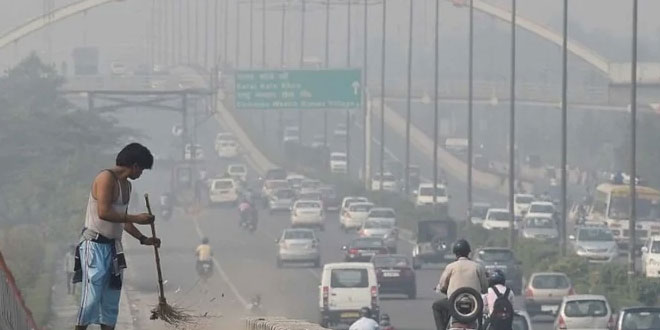New Delhi: As Delhi observed its air quality swing between ‘very poor’ to ‘severe’ through the weekend, Monday started with the air quality settled in the ‘severe’ category. Despite the Centre-run System of Air Quality and Weather Forecasting (SAFAR) reports suggesting the air quality improvement by Sunday, there was no relief from the pollutants due to the dust storm in northwest India. Delhi’s air quality index (AQI) on Monday was recorded at 402.
An AQI between 0 and 50 is considered ‘good’, 51 and 100 ‘satisfactory’, 101 and 200 ‘moderate’, 201 and 300 ‘poor’, 301 and 400 ‘very poor’, and 401 and 500 ‘severe’.
The level of Particulate Matter 2.5 (particles in the air with a diameter of less than 2.5 micrometres) was recorded at 408 while the PM10 at 117, according to SAFAR.
Also Read: Can Artificial Rain Help Curb Air Pollution In Delhi?
PM2.5 can be a matter of more serious health concern than PM10, although both are too tiny to be seen with a naked eye and pose health threats. Routine exposure to PM2.5 pollutants can lead to diseases like cancer and increases chances of stroke. PM10 however, is the prime pollutant in a dust storm, including the one being faced by northwest India.
SAFAR has predicted the air quality to worsen this week as the dust storm expected to continue through the week. SAFAR told PTI,
Gusty thunderstorm and occasional episodes of sudden peaking of dust at isolated places in northwest India, including Delhi, will continue for a few days.
On the other hand, Indian Meteorological Department (IMD) has forecasted light rain on Tuesday, which is expected to bring down pollution levels in Delhi.
Also Read: Air Pollution Crisis: Does India Have Enough Air Quality Monitoring Stations?
As the World Environment Day with its theme of “air pollution” approaches on June 5, the United Nations Environment Programme (UNEP) released a new study titled “Air pollution hurts the poorest more”. The study attempts to draw attention to how the polluted air hurts the poorest most, with 91 per cent of premature deaths occurred in low and middle-income countries.
The study further urges the governments across the globe to deal with this silent killer by adopting 4Rs – reduce, recycle, reuse, recover – in their respective national policies.
With inputs from PTI.
NDTV – Dettol Banega Swachh India campaign lends support to the Government of India’s Swachh Bharat Mission (SBM). Helmed by Campaign Ambassador Amitabh Bachchan, the campaign aims to spread awareness about hygiene and sanitation, the importance of building toilets and making India open defecation free (ODF) by October 2019, a target set by Prime Minister Narendra Modi, when he launched Swachh Bharat Abhiyan in 2014. Over the years, the campaign has widened its scope to cover issues like air pollution, waste management, plastic ban, manual scavenging and menstrual hygiene. The campaign has also focused extensively on marine pollution, clean Ganga Project and rejuvenation of Yamuna, two of India’s major river bodies.






























